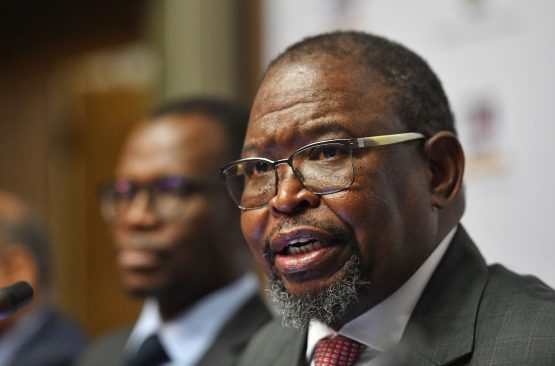Godongwana’s plan to get SA off the grey list

Speedily bolstering South Africa’s security cluster must be at the heart of the country’s efforts to exit the Financial Action Task Force (FATF) grey list, according to Finance Minister Enoch Godongwana.
“We’ve got to strengthen that cluster because most of our problems arise from that cluster,” Godongwana said on Friday.
He was speaking at an event titled ‘Beyond the Greylist: Mapping South Africa’s Recovery’, hosted by the Association of Black Securities and Investment Professionals and lender Standard Bank at the latter’s Rosebank headquarters.
A big risk is being seen by the international community as being lax on critical issues, Godongwana said.
“What we’re trying to do … is to make sure that we can strengthen the security cluster and develop a programme of action … in order to get out of this thing as quickly as possible.”
Godongwana’s remarks come a month after the FATF put South Africa on the grey list for falling short in measures aimed at countering money laundering and terrorism-financing.
The FATF presented South Africa with 67 recommended actions in October 2021.
By the end of January 2025 the country must have tackled eight “strategic deficiences”, as National Treasury puts it. These are areas where it does not yet meet FATF standards.
Godongwana previously said South Africa could exit the list by mid-2024. This was in an interview with Moneyweb editor Ryk van Niekerk on the radio show RSG Geldsake.
He said the FATF’s findings came as no surprise given Judge Raymond Zondo’s state capture report, the publication of which followed exhaustive testimony given at the Zondo Commission of Inquiry into allegations of corruption during former president Jacob Zuma’s years at the helm.
Legislation
South Africa has already pushed through new legislation to tackle some of the FATF’s pain points, and Godongwana allotted as much as R14 billion in his 2023 budget to support, over the medium term, the implementation of the recommendations laid out in the State Capture Report and the FATF’s findings, among other things.
Godongwana added that he is due to table a new procurement bill before parliament at the end of the month, which will better ensure that procurement processes are both transparent and that they meet all constitutional requirements.
“We’re doing everything possible; we’re putting resources [in place] … to get out of greylisting. It is not where we want to be,” Godongwana said.
Intellidex chair Stuart Theobald said the challenges in South Africa’s criminal justice system require more than funding, adding that there needs to be more hiring activity.
“Allocating money doesn’t recruit the kinds of skills that we need … the Financial Intelligence Centre [FIC] needs to double its staff, it needs to hire forensic analysts … it’s [a] scarce skillset,” he said.
“That requires the Hawks, the police, crime intelligence to have the capability … They might have the money, but it’s a big gap to demonstrating effectiveness,” Theobald said.
“Effectiveness means investigating, leading to prosecutions, getting people into jail. That has to be the standard that we are judged on.”

